|
Music Reviews
Alternative
Blues
Books
Christmas
Classic Rock
Country
Jazz
Lounge
Oldies
Power Pop
Punk & New Wave
Reggae
Rhythm & Blues
Seventies
Texas
Special Features
Randy's Rodeo
Sex Pistols
Motown
Halloween
Valentine's Day
Information
About Me
Feedback
Links
User's Guide
Support Me
Amazon
iTunes
Sheet Music Plus
|
Sock it to me, Santa! Visit my other website, www.hipchristmas.com Visit my other website, www.hipchristmas.com
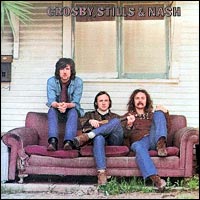 Never
has so great a reputation been staked on so little. The staying power of supergroup
Crosby,
Stills, and Nash (and sometimes Young)
is mystifying considering how little they recorded together during their most
celebrated period - and how inconsistent they've been ever since. Even sainted
Neil Young - the darling of rock critics for half a decade - is hardly
a model of consistency. With their law firm-styled name and their vaunted curriculum
vitae, CSNY seemed destined for greatness. But before their initial breakup,
CSNY recorded just two original albums, Crosby
Stills & Nash (1969, sans Young) and Déjà
Vu (1970). They supplemented these with a very good live album, Four
Way Street (1971), and a greatest hits package, So
Far (1974). Hardly an impressive resumé. Never
has so great a reputation been staked on so little. The staying power of supergroup
Crosby,
Stills, and Nash (and sometimes Young)
is mystifying considering how little they recorded together during their most
celebrated period - and how inconsistent they've been ever since. Even sainted
Neil Young - the darling of rock critics for half a decade - is hardly
a model of consistency. With their law firm-styled name and their vaunted curriculum
vitae, CSNY seemed destined for greatness. But before their initial breakup,
CSNY recorded just two original albums, Crosby
Stills & Nash (1969, sans Young) and Déjà
Vu (1970). They supplemented these with a very good live album, Four
Way Street (1971), and a greatest hits package, So
Far (1974). Hardly an impressive resumé.
Everything else has consisted of solo records, side projects, and an ongoing
series of reunion albums which vary mainly in their degree of lameness. Still,
some great music came out of those early records, the product of four guys at
the height of their creative powers. CSN's harmonies are legendary, and the
songs - when they avoid hippies clichés - are some of the best they ever
wrote, separately or on tandem. Beyond that, Crosby Stills Nash & Young
created some some very important music, music that determined the direction
rock took at a very critical juncture. CSNY applied the acid rock aesthetic
to folk music; in essence, they unplugged. The 60's generation, weary of tumult
and ear-splitting cacophony, unplugged with them. CNSY, presold on the basis
of their pedigree, pulled this off with such aplomb that they were crowned rock
royalty - superstars for life - despite the sundry musical crimes they've committed
during the intervening 30 years.
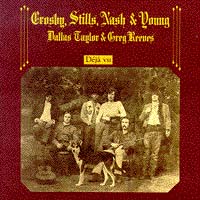 David
Crosby, Stephen Stills, and Graham Nash fell together after leaving their former bands
- the Byrds, Buffalo Springfield,
and the Hollies, respectively - over artistic differences. The trio's debut album, Crosby
Stills & Nash, made quite a splash, breaching the Top 10 and spawning Top 30
hit singles with Nash's "Marrakesh Express" (which the Hollies had earlier
refused to record) and "Suite: Judy Blue Eyes" (Stephen Still's musically
complex paean to Judy Collins). These songs and others, like "Guinnevere," "Long
Time Gone," and "Wooden Ships," are testimony to a fleeting synergy
the trio would never recapture. Together, Crosby Stills & Nash made music far more
beautiful than they were capable of separately. Before long, the egos that brought
them together would split them apart. But, when they yoked their collective talents
- in particular, their preternatural harmonies - behind a good song, they deserved
every bit of the vainglorious press they would soon receive. David
Crosby, Stephen Stills, and Graham Nash fell together after leaving their former bands
- the Byrds, Buffalo Springfield,
and the Hollies, respectively - over artistic differences. The trio's debut album, Crosby
Stills & Nash, made quite a splash, breaching the Top 10 and spawning Top 30
hit singles with Nash's "Marrakesh Express" (which the Hollies had earlier
refused to record) and "Suite: Judy Blue Eyes" (Stephen Still's musically
complex paean to Judy Collins). These songs and others, like "Guinnevere," "Long
Time Gone," and "Wooden Ships," are testimony to a fleeting synergy
the trio would never recapture. Together, Crosby Stills & Nash made music far more
beautiful than they were capable of separately. Before long, the egos that brought
them together would split them apart. But, when they yoked their collective talents
- in particular, their preternatural harmonies - behind a good song, they deserved
every bit of the vainglorious press they would soon receive.
On the eve of CSN's debut tour, Neil Young (with whom Stills had played in Buffalo
Springfield) joined the group, and they quickly became legends at the 1969 Woodstock
festival - their second appearance on stage together. Déjà Vu -
the only proper CSNY album until 1988 - followed in 1970, zooming to #1 and sealing
the group's status as counter-culture cultural leaders. On its surface, Déjà Vu was
a masterwork, a pristine triumph of collaboration accomplished during hundreds of hours
of labor in the studio. Highlighted by the lead-off track "Carry On" and
the title cut, both of which raised the barre for rock music to new heights, Déjà Vu presented
a varied menu, with Neil Young's edgy compositions ("Helpless") counterbalancing
Graham Nash at his most twee ("Our House"). On closer inspection, Déjà Vu is
really the work of four individuals, and, despite dazzling harmonies that unite the
disparate tracks, it was the sound of a group growing apart as rapidly as they fell together.
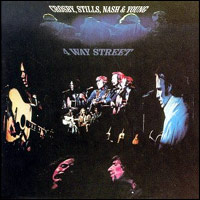 Before
the inevitable split, however, a couple of triumphs lay ahead. Shortly after, Déjà Vu was
released, four students were gunned down by the National Guard during a Vietnam War
protest at Kent State University. Neil Young's response to the tragedy, "Ohio," was
quickly recorded and released as a single. With its chunky guitar and lyrical rage, "Ohio" was
the toughest song the quartet would ever record - and an instant masterpiece. "Ohio" was backed with "Find
The Cost Of Freedom," a searching, a cappella antidote to the maelstrom
on the flipside, and together, they remain one of the most riveting moments in rock
history. On tour that summer, CSNY recorded the monumental Four
Way Street, a live album reprising their work together as well as songs from outside
their partnership. These included Neil Young's "Cowgirl In The Sand," the
Hollies' "King Midas In Reverse," and David Crosby's "Triad," written
for and rejected by the Byrds (but later recorded by Jefferson Airplane). Before
the inevitable split, however, a couple of triumphs lay ahead. Shortly after, Déjà Vu was
released, four students were gunned down by the National Guard during a Vietnam War
protest at Kent State University. Neil Young's response to the tragedy, "Ohio," was
quickly recorded and released as a single. With its chunky guitar and lyrical rage, "Ohio" was
the toughest song the quartet would ever record - and an instant masterpiece. "Ohio" was backed with "Find
The Cost Of Freedom," a searching, a cappella antidote to the maelstrom
on the flipside, and together, they remain one of the most riveting moments in rock
history. On tour that summer, CSNY recorded the monumental Four
Way Street, a live album reprising their work together as well as songs from outside
their partnership. These included Neil Young's "Cowgirl In The Sand," the
Hollies' "King Midas In Reverse," and David Crosby's "Triad," written
for and rejected by the Byrds (but later recorded by Jefferson Airplane).
By the time Four
Way Street was released in 1971, though, Crosby Stills Nash & Young were history.
Only Young had previously recorded solo (commencing in 1969 with Neil
Young), but the rest of the group quickly followed suit. All the albums - Stephen
Stills (1970), David Crosby'sIf
I Could Only Remember My Name (1971), and Graham Nash's Songs
For Beginners (1971) - were warmly received, and Stills and Nash scored hit singles with "Love
The One You're With" and "Chicago," respectively. Neil Young, however,
trumped them all in 1972 with Harvest and "Heart
Of Gold," and, ultimately, only he would go on to produce a formidable body
of work.
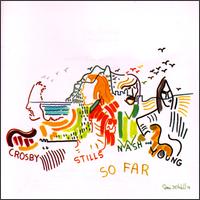 Crosby
Stills Nash & Young reunited briefly in 1974, touring to support So
Far, a collection of their best work featuring cover art by Joni Mitchell (who,
rumor has it, slept her way through the quartet). As a trio, Crosby Still & Nash
would reunite in 1977, recording fitfully thereafter. Very few of those later albums
have much to recommend them, with a few (such as Live
It Up, 1990) qualifying as outright schlock. Crosby
Stills Nash & Young reunited briefly in 1974, touring to support So
Far, a collection of their best work featuring cover art by Joni Mitchell (who,
rumor has it, slept her way through the quartet). As a trio, Crosby Still & Nash
would reunite in 1977, recording fitfully thereafter. Very few of those later albums
have much to recommend them, with a few (such as Live
It Up, 1990) qualifying as outright schlock.
So, with their far-flung solo careers
and questionable quality control, CSNY would appear to be ideally suited to boxed-set
reductionism. Sadly, though, Crosby
Stills & Nash (1992), a 4-CD collection, is a botched job. Rather than the
career retrospective it should have been, the box is rife with inferior alternate takes,
remixes, and live versions substituted for songs as essential as "Suite: Judy
Blue Eyes" and "Woodstock." (The same criticisms can leveled at the
import-only Carry
On, 1994).
Crosby
Stills & Nash is ideal for collectors, perhaps, but frustrating for the rest
of us. So then, collecting Crosby Stills Nash & Young - and the highlights from
their intertwining careers - quickly becomes an expensive ordeal. One has to purchase
nearly a dozen CDs (some of them resolutely mediocre) to cover all the bases. To
wit: the group's three original albums - Crosby
Stills & Nash, Déjà Vu,
and Four
Way Street - are essential, but "Ohio" and "Find The Cost Of Freedom" were
included only on So
Far, which means buying many of the same songs twice. Some their later albums
- mainly CSN (1977)
and Daylight Again (1982) - contain a few memorable songs ("Dark Star," "Wasted On The Way"), but those are surrounded
by utter dreck. Proceed with caution.
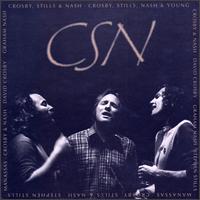 Then, attacking the seemingly endless solo and collaborative material:
across many albums as a duo, Crosby & Nash recorded
but one great song ("Immigration Man"), and it's available only on expensive
imports (or the boxed set); Graham
Nash waxed a worthwhile song or two (predominantly on Songs
For Beginners) but has little else to recommend him; and Neil Young's brilliant "Long
May You Run" is featured on an otherwise mediocre one-off collaboration by the Stills-Young
Band. Other than Young, Stephen
Stills has been the most consistent and prolific solo performer of the group. However,
Stills doesn't have a "best of" CD, requiring obsessive-compulsives (like
me) to purchase at least his first four albums: Stephen
Stills (1970), Stephen
Stills 2 (1971), Manassas (1972),
and Down
The Road (1973) - none of them particularly brilliant. Then, attacking the seemingly endless solo and collaborative material:
across many albums as a duo, Crosby & Nash recorded
but one great song ("Immigration Man"), and it's available only on expensive
imports (or the boxed set); Graham
Nash waxed a worthwhile song or two (predominantly on Songs
For Beginners) but has little else to recommend him; and Neil Young's brilliant "Long
May You Run" is featured on an otherwise mediocre one-off collaboration by the Stills-Young
Band. Other than Young, Stephen
Stills has been the most consistent and prolific solo performer of the group. However,
Stills doesn't have a "best of" CD, requiring obsessive-compulsives (like
me) to purchase at least his first four albums: Stephen
Stills (1970), Stephen
Stills 2 (1971), Manassas (1972),
and Down
The Road (1973) - none of them particularly brilliant.
And, we're not counting David
Crosby's uniformly pathetic musings (though many critics give high marks to If
I Could Only Remember My Name), nor have we considered Neil
Young's prodigious catalog, which is best left to other pages. Simply put, casual
fans will be content with So
Far (which, I should emphasize, is quite brilliant) though it omits "Marrakesh
Express," even on the remastered CD edition. Serious fans will have to pick it all up - whether hey weant to or not.
Finally, it's worth noting that, over the years, all three members have issued solo boxed sets - Crosby's Voyage (2006), Stills' Carry On (2013), and Nash's Reflections (2009) - and all three suffer from the same problems as the Crosby
Stills & Nash box. None of them have all the music that fans have a right to expect, and all of them will tax the patience of even the most devoted followers.
In light of their chequered past
and messy catalog, it bears repeating that Crosby Stills Nash & Young made some
great records, and they changed the direction of rock music - though not necessarily
for the better. But all that was over 30 years ago, and like a dysfunctional, codependent
family, CSNY (and their audience) keep breaking up and then reuniting in doomed attempts
to rekindle the flame. Sometimes the greatest wisdom is knowing when to quit, and
I, for one, will be codependent no more.
|
|